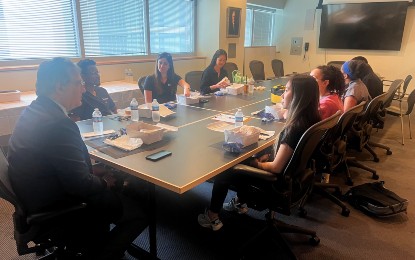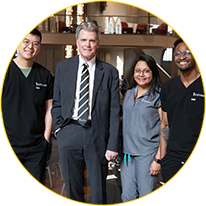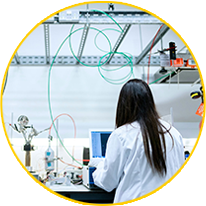Raymond Cohlmia, DDS, executive director and chief operating officer of the American Dental Association (ADA), visited in early May with University of Maryland School of Dentistry (UMSOD) administrators, faculty, and students and shared the association’s goals as it works to support dental professionals and students while advancing overall oral health.

Cohlmia having lunch with a group of students to discuss the ADA’s efforts to make dental school more affordable and answer questions directly from students. (Photo credit: Bethany Probst)
“I am deeply appreciative of Dr. Cohlmia’s visit. His engagement with our faculty, staff, and students was invaluable,” said Mark A. Reynolds, DDS, PhD, UMSOD dean.
“Under his stewardship, the American Dental Association, one of the nation's premier dental organizations, continues to expand its impact by working to increase access to oral health care, harness new technologies such as artificial intelligence (AI), and build inclusive partnerships with other professional organizations. At UMSOD, we are enthusiastic about the transformative effect his leadership will have on our profession and look forward to future collaborations.”
While visiting, Cohlmia spent time with faculty members, toured the school’s dental clinics, and had lunch with a group of students.
During lunch, he discussed the ADA’s efforts to make dental school more affordable by implementing tax credits, loan deferment, and reduced cost of education for dental colleges across the country.
“My job is to make your life better,” Cohlmia told the students. “I want you all to have a good, healthy, practicing career. Where that starts is making sure students can get into dental schools without worrying about costs and practice where they want and when they want.”
Before becoming the ADA’s executive director in 2021, Cohlmia worked with the association in multiple roles. He served as consultant and chair for the ADA’s Council on Membership, chair of Committee on the New Dentist, Twelfth District Representative, Board of Trustees member, and member of its House of Delegates, which develops association policy.
He also previously held leadership positions at the University of Oklahoma College of Dentistry, including director of Comprehensive Care, assistant dean for Patient Care, and dean. Prior to that, Cohlmia ran a successful private dental practice for 26 years.
While visiting UMSOD, Cohlmia met with Man-Kyo Chung, DMD, PhD, professor, Department of Neural and Pain Sciences, and assistant dean of research and graduate studies; Robert Ernst, PhD, Distinguished University Professor, Dr. Paul and Mrs. Jean Corcoran Endowed Professor and chair, Department of Microbial Pathogenesis; and Richard Traub, PhD, professor and chair, Department of Neural and Pain Sciences.
The four had the opportunity to discuss research opportunities for UMSOD dental students such as the University of Maryland Dental Student Summer Research Training Program and the Research with Mentors elective course, which allows dental students to select a faculty mentor who provides them with personalized training in research.
“Dr. Cohlmia expressed profound admiration for the strong collaborative research programs spanning UMSOD departments and the UMB campus,” Chung said. “He also noted with surprise the depth of UMSOD's commitment to basic science education and its interdisciplinary approach, highlighting the innovative nature of our academic programs.”
Cohlmia toured UMSOD’s clinical spaces with Louis DePaola, DDS, MS, associate dean of clinical affairs and professor, Department of Oncology and Diagnostic Sciences; and Robert Windsor, DDS, FICD, director of clinical operations. “We also discussed some of Dr. Cohlmia’s new initiatives with the ADA to encourage young dentists to become involved in the ADA and to consider teaching,” Windsor said.
In efforts to learn about UMSOD’s involvement with the applications of AI in dentistry, Cohlmia met with Jeffery B. Price, DDS, MS, clinical professor and director of Oral Radiology; and Ahmed S. Sultan, BDS, PhD, assistant professor and director of the Advanced Program in Oral and Maxillofacial Pathology Residency; who also are co-director and director, respectively, of the Division of Artificial Intelligence Research in the Department of Oncology and Diagnostic Sciences.
Price and Sultan discussed their recent assessment of six AI chatbots on controversial and difficult topics in diagnostic dental specialties, which was published recently in the journal of Oral Surgery, Oral Medicine, Oral Pathology and Oral Radiology. "We were able to discuss strategies with Dr. Cohlmia on how the ADA could foster and enhance AI in dental education,” Sultan said.
“Dr. Cohlmia also emphasized the ADA’s plans to support new dental graduates' recruitment into positions as dental school faculty members by strengthening the regulations for support of educational loan re-payment through the legislative process.”



